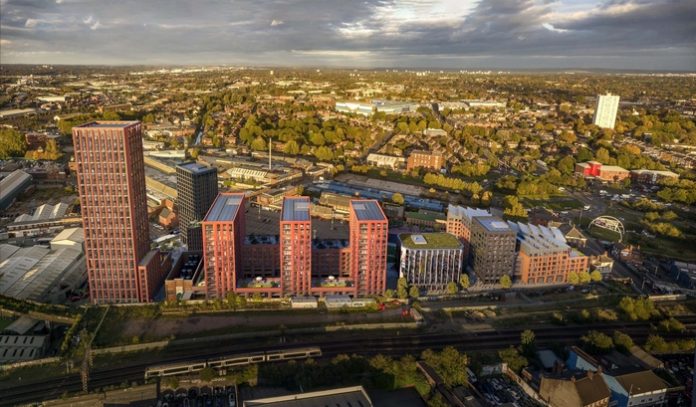Birmingham City Council has approved plans for Cole Waterhouse’s £260m Upper Trinity Street (UTS) scheme in Digbeth, Birmingham. The landmark 5.11 acre development will see the existing industrial land transformed into a cultural, commercial and residential scheme including a new one acre public park called Pump House Park.
Designed by Corstorphine&Wright with sustainability at its core, UTS will include 943 new homes, some with live-work space and roof gardens, a 133-bedroom hotel, 60,000 sq ft of flexible commercial space, car parking and large new areas of public realm across a network of landscaped yards, squares and hidden spaces.
The development of UTS is expected to create 600 jobs during the construction phase, deliver £229.5m GVA to the local economy and will create up to 313 additional jobs once built. When funding is secured work is expected to start in Summer 2022 and the scheme will be developed over a number of phases with the first phases completing in 2025.
Since securing the land in 2019 Cole Waterhouse has been working closely with the local community, Birmingham City Council and neighbouring landowners to evolve its vision for Upper Trinity Street.
Cole Waterhouse CEO Damian Flood said: “Our vision for Upper Trinity Street is to create a superb new space for Digbeth which marries the area’s rich industrial history and diverse culture with high quality, well designed buildings and spaces for future generations to enjoy. This is a really important moment in Digbeth’s continuing evolution and we are very proud to have been granted permission to proceed with developing UTS and helping to secure a bright future for Digbeth.
“Over the past two years we have worked closely with Birmingham City Council to continually shape our designs to make sure we deliver a new neighbourhood which recognises the needs of the local community and which protects and enhances the area so that it can once again prosper and thrive.
“As developers we take our responsibility to nurture the unique “Digbethness” of the area very seriously. The community response to our plans was overwhelmingly positive and our first local appointment was to bring in Jez Collins as the project’s local cultural lead. He has been working to ensure that our proposals would support and protect the area’s heritage and culture, something that was absolutely central to our vision for UTS and we now look forward to seeing that vision come to life.”
Ian Ward, Leader of Birmingham City Council added: “This will be a golden decade of inclusive growth, job creation and regeneration in Birmingham and Digbeth is identified as one of our primary growth quarters. As we build homes and create opportunities for a young and growing population, UTS has an important role to play in the city’s ongoing renaissance, given its proximity to HS2 and being within the expanded City Core.”
The project team has worked collaboratively with the Canal & River Trust to develop Pump House Park which is designed around the historic lock keepers cottage which is planned to be retained and renovated. The park will include a range of different spaces including playable landscapes as well as biodiversity features and extensive soft landscaping including native tree planting. Historic features will be retained and contextualised with interpretation boards introduced celebrating the site’s unique Victorian engineering history.
Cole Waterhouse has also been working alongside other stakeholders to ensure a joined-up approach to shape the future of Digbeth. Through collaboration they aspire to create a vibrant and attractive neighbourhood to live and work in with new undiscovered spaces such as the proposed Skypark that will unlock a largely forgotten area of Digbeth and connect it to the rest of Birmingham.
Cole Waterhouse has a strong track record across the UK of successfully unlocking opportunity, growth and value. It puts collaboration and placemaking at the heart of its projects leaving long-lasting and positive legacies.
The project team includes; architect Corstorphine&Wright, landscape architects Exterior Architecture, cultural advisor Jez Collins; planning consultants Barton Willmore; project managers Henry Riley; Civils and Structural Engineers Renaissance.



















